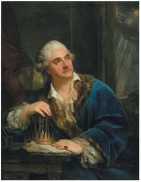3071579753
Zofia Zielińska
The Partitions of Poland

MarccUa Bacciarcllcgó (*1793). Olej na' płótnie
jej utraty. W traktatach przymierza, jakie Berlin i Petersburg zawierały, od roku 1720 w tajnych artykułach dotyczących Polski oba mocarstwa zobowiązywały się ze wszystkich sił czuwać nad niedopuszczeniem do aukcji wojska i ograniczenia „wolności”, a przez „wolność” rozumiały przede wszystkim zachowanie liberum veto jako instrumentu bezrządu, konserwację wolnej elekcji, ułatwiającej obcym siłom ingerencję w polskie sprawy, oraz obniżającą sprawność państwa słabość władzy królewskiej. W praktyce w okresie intensywnej walki o reformę w latach czterdziestych Prusy opłacały i organizowały sejmowych „zrywaczy" z obozu Potockich, a Rosja patrzyła na to z cichą aprobatą. Wkraczała na arenę wówczas, gdy polscy reformatorzy decydowali się na wprowadzenie stanu wyjątkowego, to znaczy zorganizowanie sejmowej konfederacji, której veto nie miało mocy zerwać. Zakazując konfederacji pod groźbą uderzenia całą roz-porządzalną siłą (1744,1748,1750 i zapewne 1752), Petersburg uzasadniał swą interwencję przyczynami doraźnymi, stwarzając iluzje, że w przeciwieństwie do Berlina nie był zasadniczo przeciwny polskiemu odrodzeniu.
Polska była za słaba, by groźbę rosyjskiego uderzenia zlekceważyć. „Familia” i dwór wycofywały się więc z konfederackich planów, licząc, że może następny sejm Rosja potraktuje łaskawiej. Zdając sobie sprawę z wrogości Prus wobec jakichkolwiek ulep-structive actions were watched carefully by the neighbouring guardians of Poland s weakness, mainly Russia and Prussia.
It was very much in the interests of both those States not to aliow Poland to enlarge its army or introduce political reforms. Prussia, bent on expanding its territory, viewed the weak Poland as potential plunder. Russia de facto already possessed this plun-der, and perceived the revival of the Polish State as a threat of losing it. From the year 1720 onward, in the treaties of alliance between Berlin and St. Petersburg thcrc was a seciet clause re-garding Poland, in which both States undertook to prevent, by all means possible, the enlargement of the army and the limita-tion of the “freedoms” there. But what Russia and Prussia meant by those “freedoms” were chiefly the liberum vetot which was the instrument of governmental chaos, as well as the preservation of the frce election, which cnabled the forcign powers to interfere in Polish afłairs, and the relatively limited scope of the royal pre-rogatives, which lessened the efłectiveness of the government. In practice, during the period of heated refbrmist debates of the 1740s, Prussia canvassed and paid members of the Potocki fac-tion to regularly annul sessions of the Seym, and Russia observed this roudne wirh silent approval. But when the Polish reformers decided to introduce extraordinary measures, that is to create a Seym confederation which the liberum veto did not have the power to inva!idate, Russia actively entered the gamę. While re-peatedly (in 1744,1748,1750 and possibly in 1752) forbidding the establishment of such a confederation on pain of an attack with all the military force avai!able, St. Petersburg nevertheless justified its intervendon with improvised reasons, thus creating an illusion that Russia, in contrast to Prussia, was in principle not at all against the revival of Poland.
Poland was too weak to disregard the threat of the Russian invasion. The “Family” and the court thereforc gave up plans of establishing a confederation, hoping that perhaps the next session of the Seym would find morę favour in Russia’s eyes. Al-though aware of Prussia’s immovable opposidon to reforms in the Commonwealth, members of the Czartoryski faedon were nevertheless deluded when it came to Russian affairs. They were of the opinion that in favourable circumstances Russia, while obviously having a massive advantage over Poland, would agree to the enlargement of the army and some political reforms, if only in a limited scope and under tight Russian control. This view was the foundation of their pro-Russian policy and of the hope with which they entered the period of the interregnum af-ter the death of Augustus III in 1763. It was ałl the morę neces-sary to comply with their huge neighbours wishes sińce during
Wyszukiwarka
Podobne podstrony:
KWARTALNIKPOLONICUM Zofia ZielińskaThe Partitions of Poland mieli spokrewnieni z wieloma domami
KWARTALNIKPOLONICUM Zofia ZielińskaThe Partitions of Poland antyrosyjską demonstrację wojenną na
Rozbiory Polski Dorpat Q l^yneburg Troki,- To] °Matbork Lidzbarl Drahim Mińskę The Partitions of Pol
Rozbiór III Dorpat Q l^yneburg Troki,- To] °Matbork Lidzbarl Drahim Mińskę The Partitions of Poland
Rozbiory Polski Dorpat Q l^yneburg Troki,- To] °Matbork Lidzbarl Drahim Mińskę The Partitions of Pol
Rozbiory Polski Dorpat Q l^yneburg Troki,- To] °Matbork Lidzbarl Drahim Mińskę The Partitions of Pol
KWARTALNIKPOLONICUM Zofia ZielińskaRozbiory Polski Wykład o genezie rozbiorów Rzeczypospolitej
KWARTALNIKPOLONICUM Zofia ZielińskaRozbiory Polski szeń w Rzeczypospolitej, w stosunku do Rosji
KWARTALNIKPOLONICUM Zofia ZielińskaRozbiory Polski w tym także swego ambasadora Nikołaja Repnina, kt
KWARTALNIKPOLONICUM Zofia ZielińskaRozbiory Polski wtedy, gdy o nim decydowano, nikt w Petersburgu n
Teams Championship of Poland - SWISS(ROUND 3_5) p 3N p p P rozgrywki na priv :), m
II rozbiór RP KfccrkJIIIL %P%kov Tv#co > SkKks *twg f / Zytom*f7Republic of Poland After Second P
ZOFIA KACZOROWSKA PRECIPITATION IN POLAND IN LONG-PERIOD AVERAGES Summary In the first part of this
Wojciech Kaute Michał llohrzynskPs synlhcsis of Ihc bisiory of Poland Sumniary M. Dobrzyński *s synl
potwierdzenie zgodności obiektu portowego I RZECZPOSPOLITA POLSKA REPUBLIC OF POLAND
CONTENTS L. Starkel: Progress in research on the evolution of the geographical environment of Poland
41671 potwierdzenie zgodności obiektu portowego I RZECZPOSPOLITA POLSKA REPUBLIC OF POLAND
więcej podobnych podstron